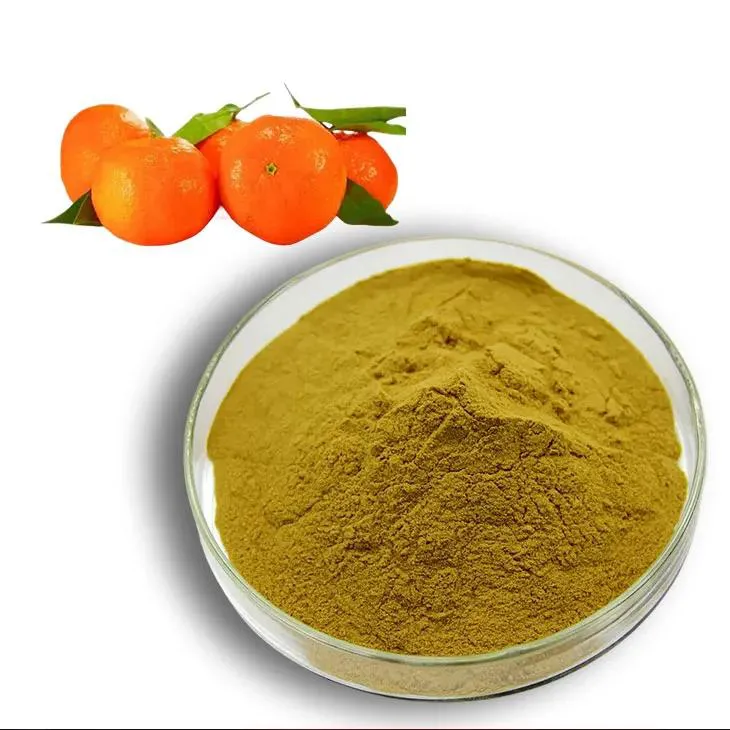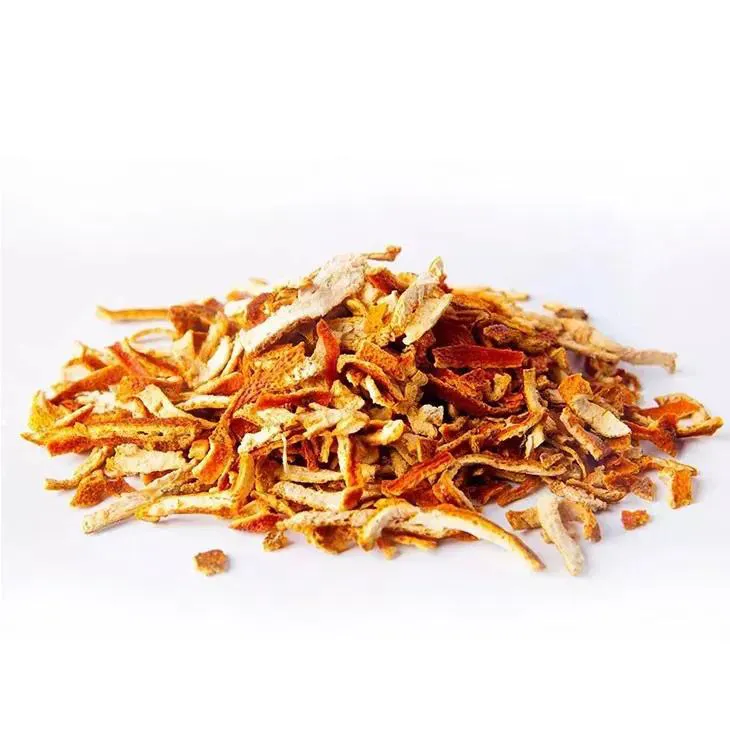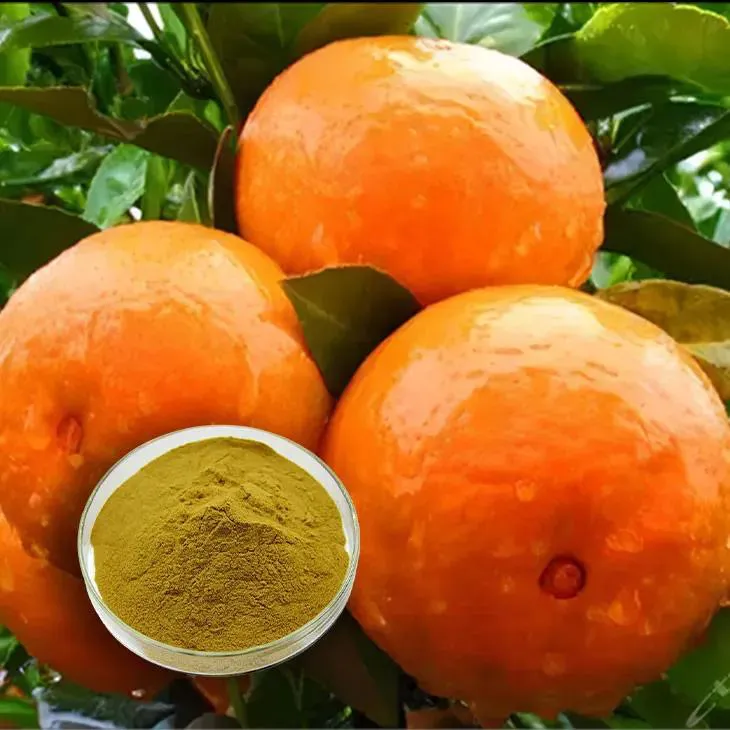- 0086-571-85302990
- sales@greenskybio.com
Six Amazing Benefits of Citrus Bioflavonoids for Perfect Skin!
2024-11-13

Introduction
Citrus bioflavonoids are becoming increasingly recognized for their significant contributions to skin health. These natural compounds, found abundantly in citrus fruits such as oranges, lemons, and grapefruits, offer a plethora of benefits that can transform the skin's appearance and overall health. In this article, we will explore in detail the six amazing benefits of Citrus bioflavonoids for achieving perfect skin.

1. Antioxidant Powerhouse
Citrus bioflavonoids are powerful antioxidants. In the world of skin health, antioxidants play a crucial role. The skin is constantly exposed to environmental stressors such as ultraviolet (UV) radiation, pollution, and cigarette smoke. These factors generate free radicals within the body. Free radicals are highly reactive molecules that can cause damage to cells, including skin cells.
When free radicals attack skin cells, they can lead to premature aging. This is manifested in the form of wrinkles, fine lines, and a loss of skin elasticity. By acting as antioxidants, citrus bioflavonoids can neutralize these free radicals. They donate electrons to the free radicals, thereby making them less reactive and less likely to cause harm to the skin cells.
Studies have shown that the antioxidant properties of citrus bioflavonoids are comparable to, and in some cases even more effective than, well - known antioxidants like vitamin C. For example, a study conducted on a group of participants exposed to high levels of environmental pollution found that those who consumed citrus bioflavonoid - rich supplements had significantly lower levels of oxidative stress markers in their skin compared to those who did not. This indicates that citrus bioflavonoids can effectively protect the skin from the damaging effects of free radicals.

2. Improvement of Skin Elasticity
Another remarkable benefit of citrus bioflavonoids is their ability to improve skin elasticity. Elasticity is what gives the skin its firmness and ability to bounce back into shape. As we age, the production of elastin, a protein responsible for skin elasticity, decreases.
Citrus bioflavonoids can stimulate the production of elastin in the skin. They do this by interacting with the cells in the dermis, the layer of skin where elastin is produced. By promoting elastin production, citrus bioflavonoids help to keep the skin looking firm and taut.
Moreover, improved skin elasticity can also reduce the appearance of cellulite. Cellulite is often caused by a lack of skin elasticity, which allows fat cells to push through the connective tissue beneath the skin. By enhancing skin elasticity, citrus bioflavonoids can contribute to a smoother and more even - textured skin surface.
Research has demonstrated that regular consumption of citrus bioflavonoids can lead to a visible improvement in skin elasticity over time. In a clinical trial, women who took citrus bioflavonoid supplements for a period of three months showed a significant increase in skin elasticity measurements compared to the control group.

3. Anti - Inflammatory Properties
Citrus bioflavonoids possess anti - inflammatory properties. Inflammation in the skin can be caused by a variety of factors, including allergens, irritants, and certain skin conditions such as acne and eczema.
When the skin becomes inflamed, it can appear red, swollen, and itchy. This not only affects the appearance of the skin but can also cause discomfort. Citrus bioflavonoids can help to reduce this inflammation. They work by inhibiting the production of inflammatory mediators in the skin.
For example, they can suppress the production of cytokines, which are molecules that play a key role in the inflammatory response. By reducing cytokine production, citrus bioflavonoids can calm inflamed skin and reduce redness and irritation.
In addition, for those with acne - prone skin, the anti - inflammatory properties of citrus bioflavonoids can be particularly beneficial. Acne is often associated with inflammation in the sebaceous glands and hair follicles. By reducing inflammation, citrus bioflavonoids can help to prevent the formation of acne lesions and promote the healing of existing ones.
Studies have shown that topical application of citrus bioflavonoid - based creams can effectively reduce skin inflammation in patients with eczema. The creams were found to be well - tolerated and provided significant relief from itching and redness.
4. Promotion of Collagen Production
Citrus bioflavonoids are also known for their ability to promote collagen production. Collagen is the most abundant protein in the human body and is a crucial component of the skin.
It provides structural support to the skin, giving it strength and thickness. As we age, collagen production naturally declines, leading to the formation of wrinkles and a loss of skin firmness.
Citrus bioflavonoids can stimulate the fibroblasts, the cells in the skin responsible for collagen production. By activating these cells, citrus bioflavonoids encourage the synthesis of new collagen.
This new collagen can fill in the gaps in the skin's structure, reducing the appearance of wrinkles and fine lines. It also helps to plump up the skin, giving it a more youthful and radiant appearance.
Research has indicated that citrus bioflavonoids can enhance collagen production both in vitro and in vivo. In laboratory studies, skin cells treated with citrus bioflavonoids showed increased collagen synthesis compared to untreated cells. In human trials, participants who consumed citrus bioflavonoid - rich products had improved skin texture and a reduction in the depth of wrinkles, which is attributed to the increased collagen production.
5. Skin Hydration
One of the important aspects of perfect skin is proper hydration. Citrus bioflavonoids can contribute to skin hydration in multiple ways.
Firstly, they can help to strengthen the skin's barrier function. The skin's barrier is made up of lipids and proteins that prevent water loss from the skin. Citrus bioflavonoids can enhance the integrity of this barrier, reducing transepidermal water loss (TEWL).
Secondly, they can also increase the water - holding capacity of the skin cells. They do this by interacting with the glycosaminoglycans (GAGs) in the skin. GAGs are molecules that can bind water, and by increasing their function, citrus bioflavonoids can help the skin to retain more moisture.
When the skin is well - hydrated, it appears plump, smooth, and healthy. Dehydrated skin, on the other hand, can look dull, flaky, and more prone to the formation of wrinkles.
Studies have shown that the use of citrus bioflavonoid - containing skincare products can significantly improve skin hydration levels. In a study comparing different moisturizers, the ones containing citrus bioflavonoids were found to be more effective in increasing skin hydration over a 24 - hour period compared to those without.
6. Even Skin Tone
Finally, citrus bioflavonoids can help to even out skin tone. Uneven skin tone can be caused by a variety of factors, including sun damage, hyperpigmentation, and post - inflammatory pigmentation.
Citrus bioflavonoids can work on the melanocytes, the cells in the skin that produce melanin. Melanin is the pigment responsible for skin color. In cases of hyperpigmentation, there is an overproduction of melanin in certain areas of the skin.
Citrus bioflavonoids can regulate the activity of melanocytes, preventing the overproduction of melanin. This can help to fade dark spots and even out the overall skin tone.
Moreover, they can also protect the skin from further sun damage, which is a major cause of uneven skin tone. By acting as antioxidants and UV protectors, citrus bioflavonoids can prevent the formation of new hyperpigmentation spots.
Clinical trials have demonstrated that citrus bioflavonoid - based skincare products can effectively improve skin tone. In a study of women with melasma (a form of hyperpigmentation), those who used a citrus bioflavonoid - containing cream for 12 weeks showed a significant reduction in the intensity of their dark spots and an overall improvement in skin tone.
Conclusion
Citrus bioflavonoids offer a wide range of benefits for the skin. Their antioxidant power, ability to improve skin elasticity, anti - inflammatory properties, promotion of collagen production, contribution to skin hydration, and effect on even skin tone make them a valuable addition to any skincare routine.
Whether consumed through citrus fruits or used in the form of skincare products, citrus bioflavonoids can help individuals achieve perfect skin. However, it is important to note that while these natural compounds can have a positive impact on skin health, they should be part of a comprehensive approach to skincare that also includes a healthy diet, proper sun protection, and a regular skincare regimen.
FAQ:
What are citrus bioflavonoids?
Citrus bioflavonoids are natural substances that are found in citrus fruits such as oranges, lemons, and grapefruits. They are a type of polyphenol and are known for their various health benefits, especially for the skin.
How do citrus bioflavonoids combat skin aging?
Citrus bioflavonoids are powerful antioxidants. They combat skin aging by neutralizing free radicals in the body. Free radicals are unstable molecules that can damage cells and tissues, including those in the skin. By eliminating these free radicals, citrus bioflavonoids help to prevent premature aging signs like wrinkles and fine lines.
Can citrus bioflavonoids really improve skin elasticity?
Yes, they can. Citrus bioflavonoids work to improve skin elasticity. They do this by interacting with the skin's cells and structures at a molecular level. This interaction helps to strengthen the skin's connective tissues, which in turn makes the skin look firmer and more elastic.
How do the anti - inflammatory properties of citrus bioflavonoids benefit the skin?
The anti - inflammatory properties of citrus bioflavonoids are very beneficial for the skin. They can reduce skin redness and irritation. This is especially useful for people with sensitive skin or those who have skin conditions like eczema or rosacea. By reducing inflammation, they also promote a healthier skin environment overall.
Do citrus bioflavonoids help with skin hydration?
Yes, they do. Citrus bioflavonoids play a role in skin hydration. They help to maintain the skin's moisture balance. This is achieved by supporting the skin's natural barrier function, which prevents water loss from the skin. As a result, the skin stays hydrated and looks healthier.
Related literature
- The Role of Bioflavonoids in Skin Health: A Comprehensive Review"
- "Citrus Bioflavonoids and Their Impact on Skin Aging"
- "Beneficial Effects of Citrus - Derived Bioflavonoids on Skin Appearance"
- ▶ Hesperidin
- ▶ Citrus Bioflavonoids
- ▶ Plant Extract
- ▶ lycopene
- ▶ Diosmin
- ▶ Grape seed extract
- ▶ Sea buckthorn Juice Powder
- ▶ Fruit Juice Powder
- ▶ Hops Extract
- ▶ Artichoke Extract
- ▶ Mushroom extract
- ▶ Astaxanthin
- ▶ Green Tea Extract
- ▶ Curcumin
- ▶ Horse Chestnut Extract
- ▶ Other Product
- ▶ Boswellia Serrata Extract
- ▶ Resveratrol
- ▶ Marigold Extract
- ▶ Grape Leaf Extract
- ▶ New Product
- ▶ Aminolevulinic acid
- ▶ Cranberry Extract
- ▶ Red Yeast Rice
- ▶ Red Wine Extract
-
Black Rice Extract
2024-11-13
-
Peppermint Extract Powder
2024-11-13
-
Angelica sinensis extract
2024-11-13
-
Withania Somnifera Extract
2024-11-13
-
Alisma Extract
2024-11-13
-
Medicinal Marshmallow Extract
2024-11-13
-
Acerola Juice Powder
2024-11-13
-
Eyebright Extract
2024-11-13
-
Alfalfa Meal
2024-11-13
-
Peppermint Oil
2024-11-13





















